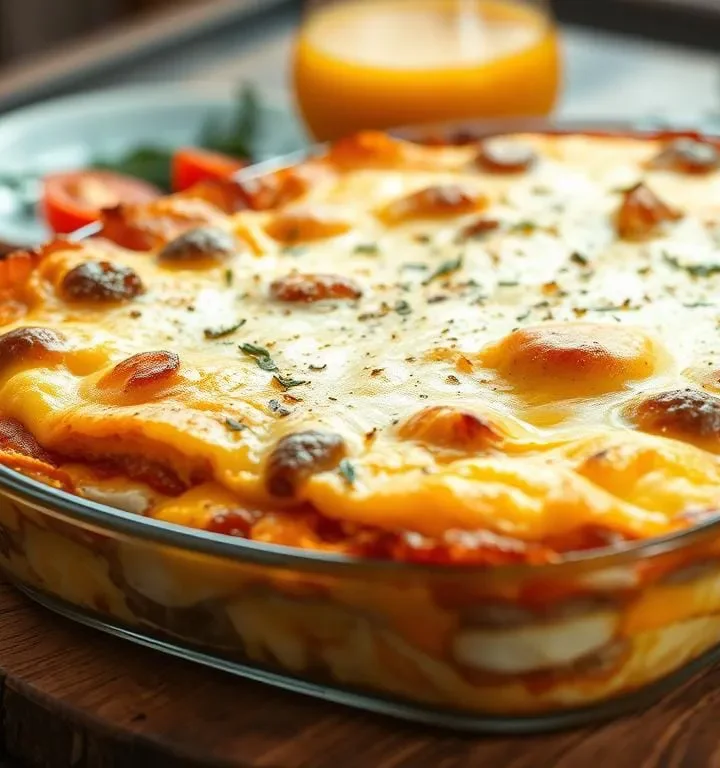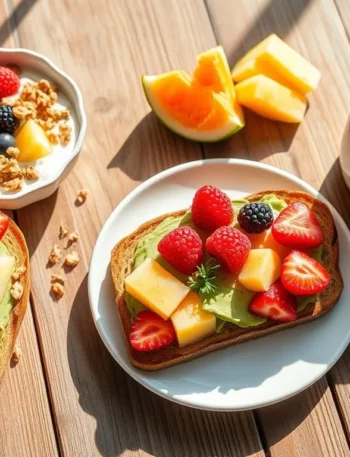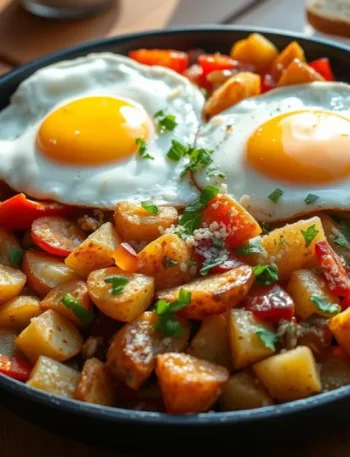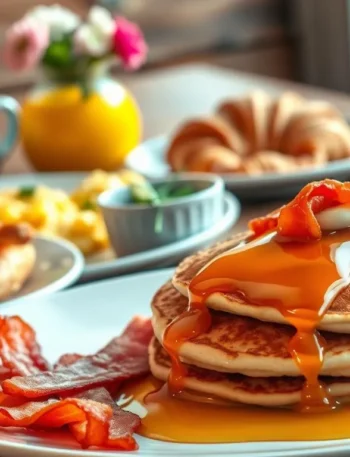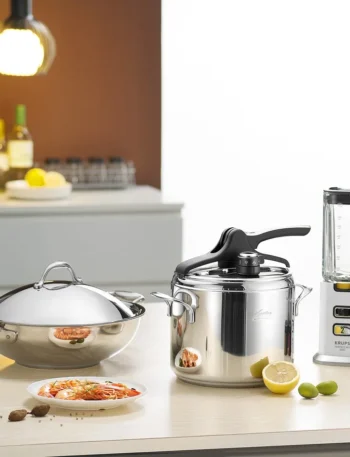Imagine waking up to the smell of a warm breakfast casserole. It fills your kitchen with joy. As a busy parent, I’ve found that easy breakfast casseroles are a morning miracle. They turn simple mornings into special family times, all thanks to one tasty dish.
Breakfast casseroles are my go-to for stress-free mornings. With a little prep, you can make delicious meals for up to 12 people. They’re great for family gatherings or weekend brunches. You’ll find everything from classic egg dishes to creative vegetarian options.
These 18 recipes will change your breakfast game, whether you’re an expert or new to cooking. Each casserole can be made ahead, so you can enjoy more time with your family. No more rushing to get breakfast ready!
Table of Contents
Essential Guide to Breakfast Casserole Recipes
Making the perfect breakfast casserole means knowing the right ingredients, tools, and how to prepare. Whether you’re looking at the top 10 breakfast casserole recipes or want to try overnight recipes, learning the basics is essential.
Understanding Base Ingredients
The key to a great breakfast casserole is its ingredients. These add flavor and texture. You’ll need:
- Eggs (8-12 large eggs for a standard casserole)
- Bread or potato base
- Cheese (cheddar, pepper jack, or mixed varieties)
- Proteins like ham, sausage, or bacon
- Seasonings and herbs
Basic Equipment Needed
To make a breakfast casserole, you’ll need specific tools for the best results:
- 9×13-inch baking dish
- Large mixing bowl
- Whisk
- Measuring cups and spoons
- Sharp knife
Time-Saving Preparation Methods
Make your breakfast casserole prep easier with these tips:
- Prep ahead: Assemble the casserole up to 24 hours in advance
- Refrigerate overnight for enhanced flavor
- Use frozen hash browns to cut down on prep time
- Chop ingredients the night before
“The secret to a great breakfast casserole is preparation and quality ingredients.”
With these basics, you’re set to make delicious breakfast casseroles that will wow your loved ones.
Make-Ahead Techniques for Busy Mornings
Make your mornings easier with overnight breakfast casserole recipes. Busy families can now enjoy tasty, homemade breakfasts without the rush.
“Prep once, enjoy all week” – Breakfast Casserole Mantra
Crockpot breakfast casserole recipes are perfect for meal planning. You can prep most casseroles up to 24 hours ahead. This lets flavors mix and saves you time in the morning.
Preparation Strategies
- Assemble casserole the night before
- Refrigerate covered for up to 48 hours
- Bake directly from refrigerator
- Use slow cooker for hands-free cooking
The secret to great make-ahead breakfast casseroles is how you store and prepare them. Refrigeration helps ingredients blend, making flavors richer and more complex.
| Preparation Method | Maximum Storage Time | Recommended Technique |
|---|---|---|
| Refrigerator Preparation | 48 hours | Cover tightly with plastic wrap |
| Crockpot Method | 12 hours | Prepare night before, set on low |
| Freezer Storage | 1 month | Wrap securely, thaw overnight |
Pro tip: Always use airtight containers or heavy-duty aluminum foil to preserve freshness and prevent flavor absorption from other refrigerator items.
By using these make-ahead techniques, you’ll make your mornings smoother and stress-free. For more breakfast prep ideas, check out this guide from BBC Good Food to ensure a delicious and hassle-free meal for your family.
Classic Egg and Cheese Breakfast Casseroles
Breakfast casseroles are the ultimate comfort food for families. They are easy to make and full of flavor. They’re great for morning meals or brunch.
Making the perfect egg and cheese casserole is all about the ingredients and techniques. Both chefs and home cooks love these dishes. They’re perfect for trying keto recipes.
Individual Ramekin Variations
Breakfast casseroles in individual ramekins are a hit. They offer many benefits:
- Customizable portion sizes
- Easy dietary accommodations
- Elegant presentation
- Quick individual servings
Family-Style Baking Options
For big gatherings, family-style baking is the way to go. A standard recipe includes:
- 12 large eggs
- 2 pounds of pork sausage
- 2 cups shredded cheddar cheese
- Baking time: 35-50 minutes
Cheese Combination Suggestions
Try different cheese combinations to elevate your casserole. Here are some tasty options:
- Cheddar and mozzarella blend
- Goat cheese with sharp cheddar
- Monterey Jack and parmesan mix
- Gruyère and Swiss cheese combination
“The secret to an outstanding breakfast casserole lies in the quality of your ingredients and the love you put into preparing them.”
Mastering these techniques will make your breakfast casseroles unforgettable. They become more than just meals; they’re special moments for your family and guests.
Hash Brown and Potato-Based Variations
Potato lovers, rejoice! Breakfast casserole recipes with hash browns are about to transform your morning meal. These hearty dishes combine crispy potatoes, protein, and rich flavors. They will make your family excited for breakfast.
Tater tot breakfast casserole recipes offer incredible versatility. You can customize your morning feast with just a few ingredients. This way, you can make a delicious and nutritious meal.
Essential Ingredients for Potato-Based Breakfast Casseroles
- 16 ounces frozen hash browns (half a standard bag)
- 1 pound ground sausage (pork or turkey)
- 2 cups sharp cheddar cheese, shredded
- 6 large eggs
- ½ cup milk or cream
When preparing your casserole, consider these pro tips:
- Thaw hash browns completely before use
- Brown sausage thoroughly before mixing
- Drain excess fat to prevent a greasy dish
“A great breakfast casserole is all about balancing textures and flavors” – Home Cooking Experts
Nutritional highlights for your potato-based breakfast casserole include:
- Calories per serving: 200 kcal
- Protein: 15g
- Carbohydrates: 7g
- Total fat: 11g
Baking your casserole requires precision. Set your oven to 350℉ and plan for 40-45 minutes of cooking time. Let the casserole rest 5-10 minutes after baking to set properly.
Pro tip: You can prepare your breakfast casserole recipes with hash browns the night before. Simply refrigerate and let it sit at room temperature for 20 minutes before baking for optimal results.
Healthy and Diet-Specific Options
Finding tasty healthy breakfast casserole recipes for different diets can be tough. Your morning meal doesn’t have to lose flavor or nutrition. There are many options for special diets.
Dietary limits shouldn’t stop your breakfast creativity. Whether you’re on a keto diet or need gluten-free options, there are many ways to make a great morning dish.
Gluten-Free Adaptations
Making gluten-free breakfast casseroles is easier than you think. Here are some tips:
- Replace traditional bread with almond flour or coconut flour
- Use gluten-free bread crumbs as a topping
- Substitute wheat-based ingredients with vegetable alternatives
Low-Carb Alternatives
Keto breakfast casserole recipes use high-protein, low-carb ingredients. Here are your options:
- Use cauliflower rice instead of potatoes
- Add more eggs and cheese
- Choose lean proteins like chicken or turkey
Vegetarian Versions
Plant-based eaters can enjoy hearty breakfast casseroles by adding:
- Tofu as a protein replacement
- Roasted vegetables for flavor
- Nutritional yeast for cheesy texture
“Healthy eating is about finding delicious alternatives, not restricting yourself.”
Every dietary adaptation keeps the comforting feel of a traditional breakfast casserole. It also meets specific nutritional needs.
Sweet Breakfast Casserole Creations
Start your day with sweet breakfast casseroles that make ordinary ingredients special. These recipes are great for Christmas or weekend brunches. They turn breakfast into a sweet treat.

Making a sweet breakfast casserole is all about creativity. You can add many tasty things:
- Fresh seasonal fruits like berries or apples
- Crunchy nuts for texture
- Sweet spices such as cinnamon and nutmeg
- Decadent ingredients like chocolate chips or caramel
“A sweet breakfast casserole is like a warm hug on a cold morning – comforting and absolutely irresistible!”
Here’s a quick look at what’s in a sweet breakfast casserole:
| Nutritional Detail | Per Serving |
|---|---|
| Calories | 211 |
| Total Fat | 14g |
| Protein | 17g |
| Carbohydrates | 4g |
For the best sweet breakfast casserole, prep it the night before. This lets flavors mix beautifully and makes morning easier. These casseroles are perfect for Christmas or weekend brunch.
Try mixing fruits, breads, and sweet things to make your own dish. From french toast to fruit-filled casseroles, they add luxury to your breakfast.
Storage and Reheating Guidelines
When making overnight breakfast casseroles, it’s important to store them right. This keeps the flavors and quality in check. Whether for a family event or meal prep, knowing how to store and reheat is key.
Refrigerator Storage Techniques
Your casserole can stay fresh in the fridge for up to 5 days. Here are some storage tips:
- Cool the casserole completely before storing
- Use an airtight container or wrap tightly with plastic wrap
- Store in the coldest part of the refrigerator
Freezer Storage Strategies
Freezing your casserole makes it last longer and is handy for meals. Here are some freezing tips:
| Storage Method | Duration | Recommended Approach |
|---|---|---|
| Unbaked Casserole | Up to 2 months | Wrap tightly in freezer-safe packaging |
| Baked Casserole | Up to 3 months | Cool completely, slice, and wrap individual portions |
Reheating Best Practices
Reheating your casserole needs attention to keep it tasty:
- Oven Method: Preheat to 350°F, cover with foil, heat for 20-30 minutes
- Microwave Method: Start with 1 minute, then add 30-second intervals
- Ensure internal temperature reaches 165°F for food safety
Pro Tip: Always let your casserole rest for 10 minutes after reheating to allow even temperature distribution.
By following these guidelines, your breakfast casseroles will stay delicious and safe. This makes meal prep easy.
Troubleshooting Common Issues
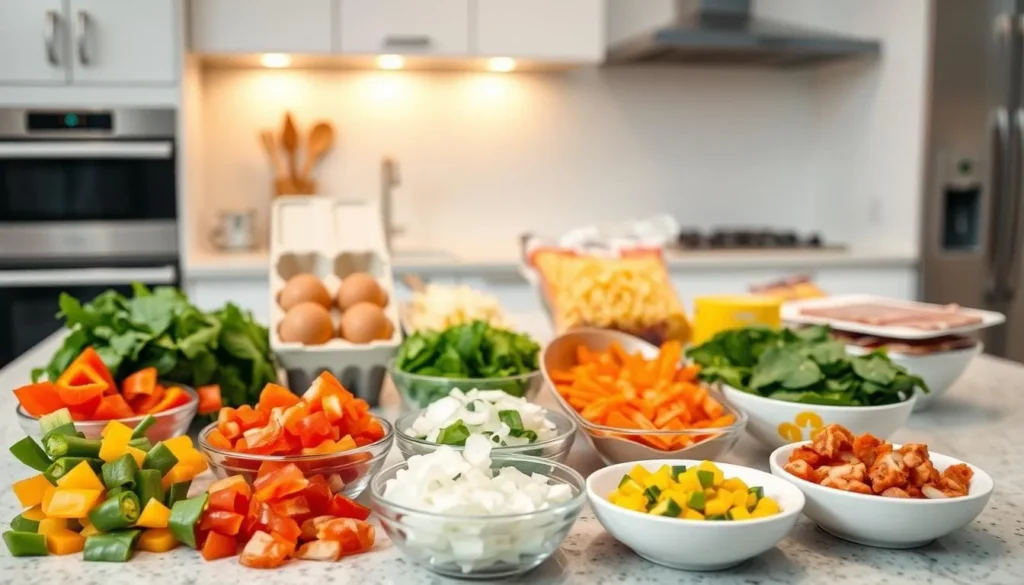
Making perfect easy breakfast casserole recipes can be tough, even for pros. Knowing common problems helps you make delicious casseroles every time.
Top Troubleshooting Strategies
- Prevent Soggy Bottoms: Use pre-dried ingredients and avoid excess moisture
- Par-bake potato or bread bases to reduce liquid absorption
- Drain vegetables thoroughly before mixing
Egg texture is key in breakfast casserole recipes. Overcooked eggs turn rubbery, while undercooked ones are unappetizing. Whisk eggs gently and cook at a moderate temperature for the best results.
“The secret to a great breakfast casserole is balancing ingredients and cooking technique” – Professional Chef
Temperature and Cooking Tips
- Maintain consistent oven temperature at 350°F
- Use a digital thermometer to check internal temperature
- Allow casserole to rest 10-15 minutes after baking
When making easy breakfast casserole recipes, the right ingredient ratios are important. Here’s what to aim for:
- 8 large eggs per recipe
- 1 cup whole milk
- 2 cups shredded cheese
Freezing and storing casseroles can affect their quality. Properly wrapped casseroles can last up to 2 months in the freezer. Thaw overnight in the fridge and reheat at 350°F for 30-40 minutes.
Conclusion
Your journey into easy breakfast casserole recipes has given you great cooking skills. You’ve learned to make simple ingredients into tasty breakfasts that everyone loves. These dishes can feed a whole family in one big pan.
The top 10 breakfast casserole recipes we’ve looked at are very versatile. They’re perfect for busy mornings or special weekend brunches. You can make them in 10-15 minutes at 350°F, saving you hours in the kitchen.
Breakfast casseroles are not just meals; they’re a blank canvas for your creativity. Feel free to try new ingredients, swap proteins, or change seasonings to match your family’s taste. Their flexibility and ease of making are what make them special.
With these skills, you’ll make your mornings better and become a breakfast star at home. You’ll have nutritious, tasty meals ready in an hour. This means your family will start each day with a great and memorable breakfast.
FAQ
How far in advance can I prepare a breakfast casserole?
You can prepare most breakfast casseroles up to 24 hours in advance. Store them in the fridge before baking. Cover them tightly with plastic wrap or foil for best results. Some recipes can even be frozen for 1-2 months, giving you great flexibility for meal planning.
Can I make a breakfast casserole without eggs?
Yes, you can make egg-free breakfast casseroles. Use tofu scramble, mashed potatoes, or plant-based egg substitutes. Vegan and vegetarian options use ingredients like silken tofu and nutritional yeast to mimic eggs.
How do I prevent my breakfast casserole from becoming soggy?
To avoid a soggy bottom, use day-old bread or toast bread cubes first. Drain excess moisture from vegetables and pat proteins dry before adding. Avoid adding too many wet ingredients. Par-baking the base or using cheese as a moisture barrier can also help.
Are breakfast casseroles good for meal prep?
Absolutely! Breakfast casseroles are great for meal prep. They can be made ahead, stored in the fridge or freezer, and reheated easily. Most recipes can be portioned and stored for 3-5 days in the fridge or up to 2 months in the freezer.
How can I make a breakfast casserole lower in calories?
To cut calories, use egg whites instead of whole eggs. Add more vegetables, low-fat cheese, and lean proteins like turkey bacon or chicken sausage. Choose whole grain bread and reduce cheese. Greek yogurt can be a creamy alternative.
Can I make a breakfast casserole in a slow cooker?
Yes! Slow cooker breakfast casseroles are convenient. Layer ingredients, cover, and cook on low for 6-8 hours or on high for 2-3 hours. This method ensures a moist, evenly cooked casserole.
What are the best proteins to use in a breakfast casserole?
Popular proteins include bacon, sausage, ham, diced chicken, or turkey. For vegetarian options, try tofu, tempeh, or plant-based sausage. Each adds unique flavor and can be customized to your taste.
How do I know when my breakfast casserole is fully cooked?
A fully cooked casserole is set in the middle and golden brown on top. Insert a knife or toothpick into the center; it should come out clean. The internal temperature should be 160°F (71°C) for egg-based casseroles.
Can breakfast casseroles be frozen?
Most breakfast casseroles freeze well. Wrap them tightly in plastic wrap and foil, and store in a freezer-safe container for up to 2 months. Thaw overnight in the fridge and reheat in the oven for best results. Some ingredients like potatoes may change texture slightly when frozen.
Are there keto-friendly breakfast casserole options?
Definitely! Keto breakfast casseroles use high-fat, low-carb ingredients. Use cauliflower instead of potatoes, replace bread with low-carb vegetables, and add eggs, cheese, and meats. Spinach, mushrooms, and various cheeses work well in keto-friendly recipes.

